Section A (GF-3c) 课件Unit 1 Where did you go on vacation(人教新目标八年级上册)
文档属性
| 名称 | Section A (GF-3c) 课件Unit 1 Where did you go on vacation(人教新目标八年级上册) | 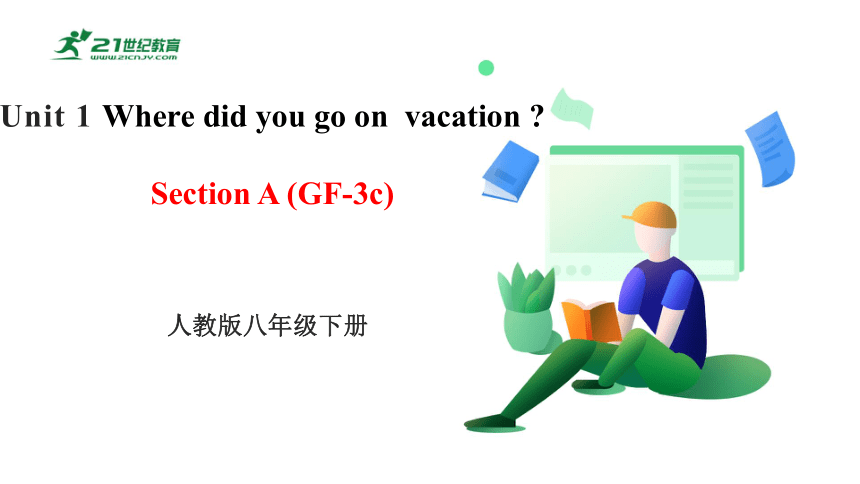 | |
| 格式 | pptx | ||
| 文件大小 | 1.5MB | ||
| 资源类型 | 试卷 | ||
| 版本资源 | 人教新目标(Go for it)版 | ||
| 科目 | 英语 | ||
| 更新时间 | 2023-06-30 16:57:56 | ||
图片预览

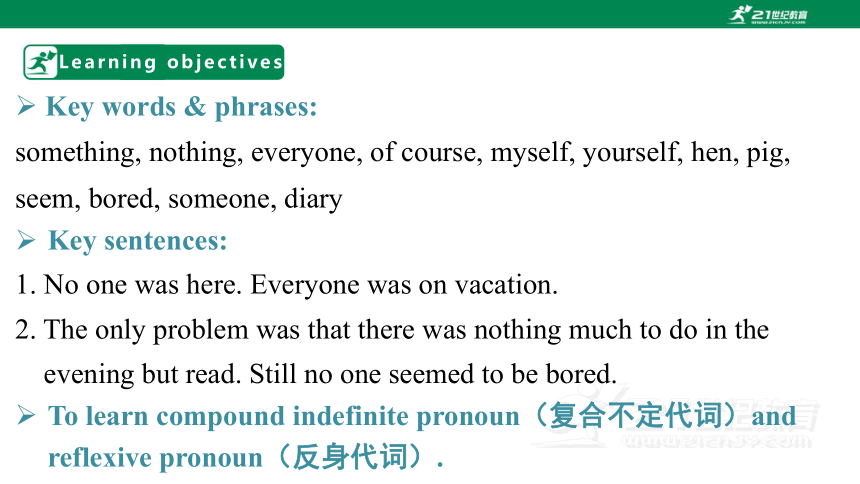

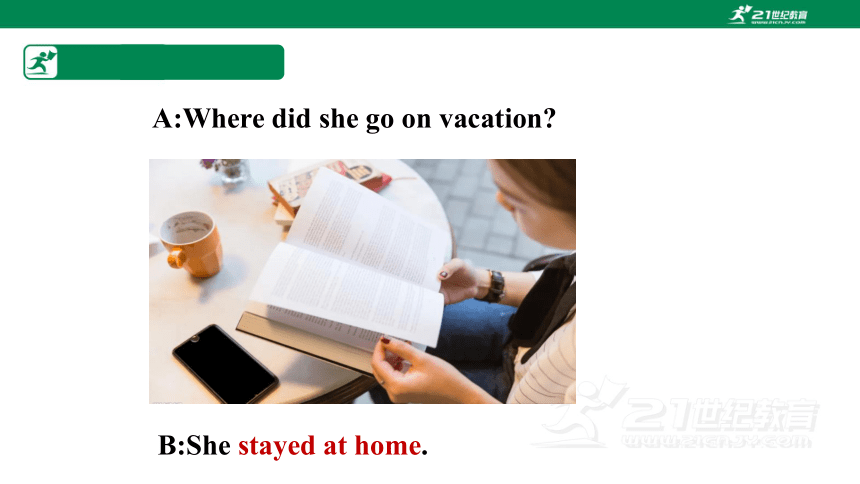

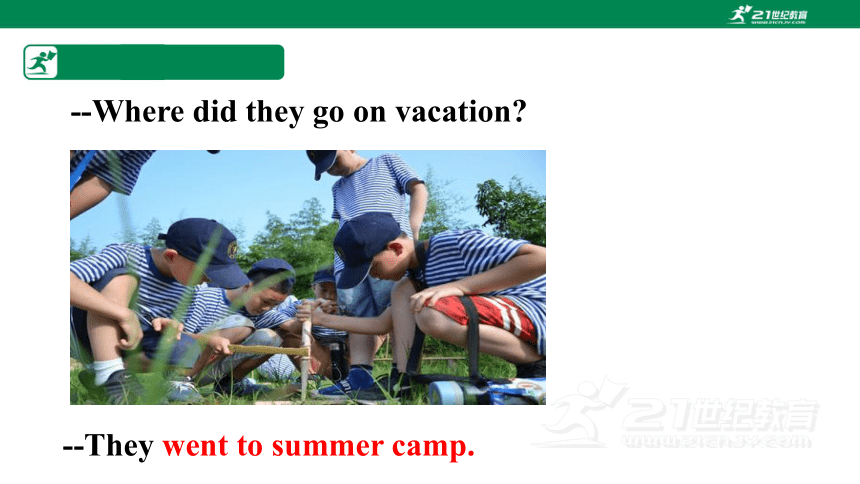
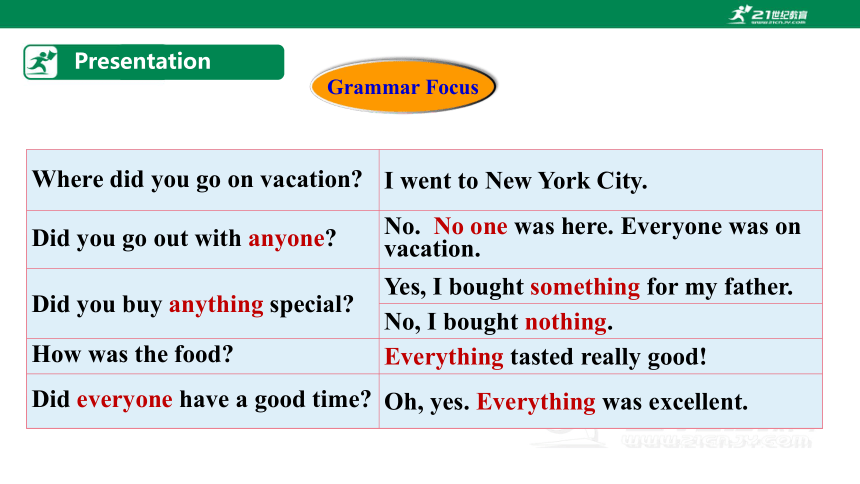
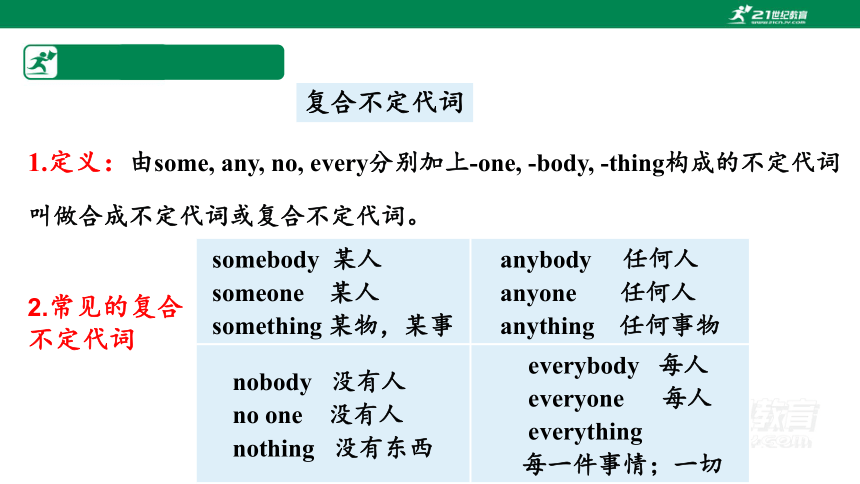
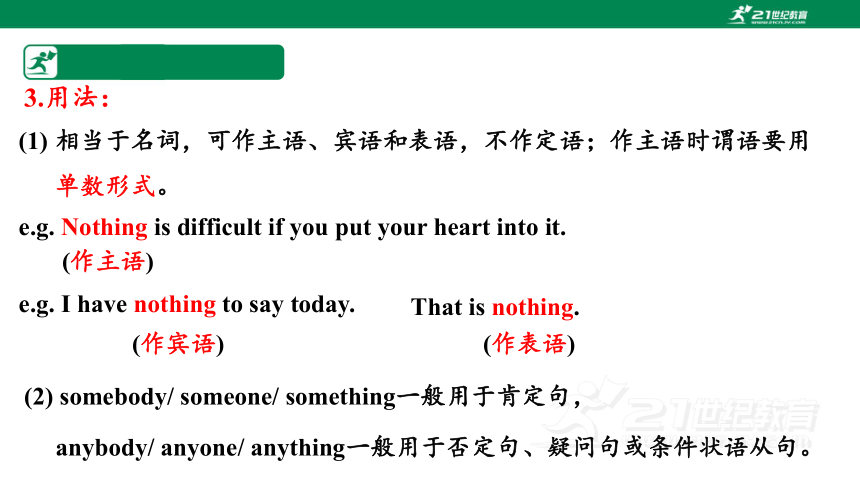
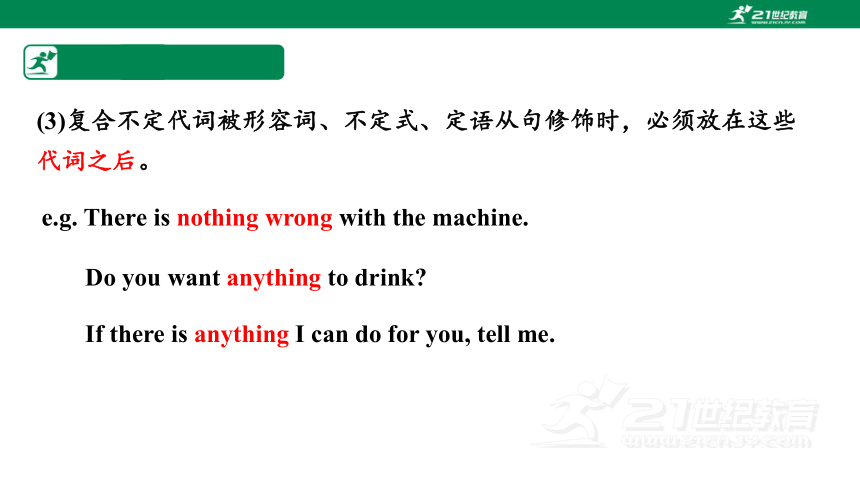
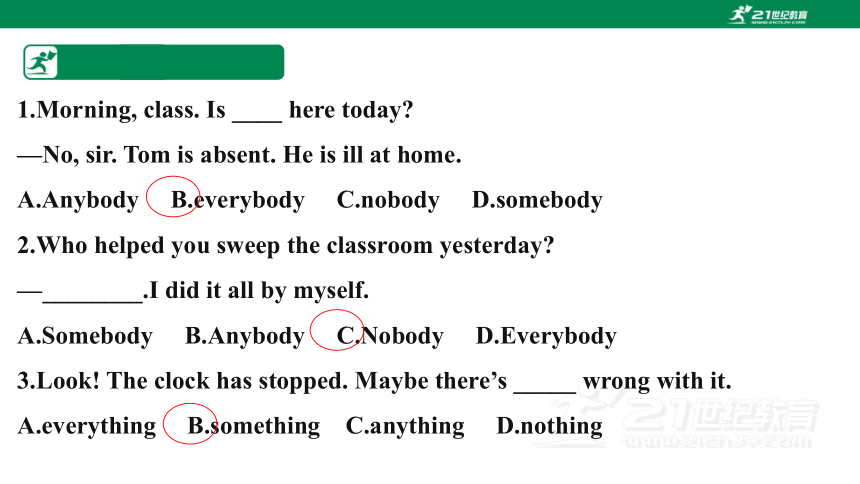
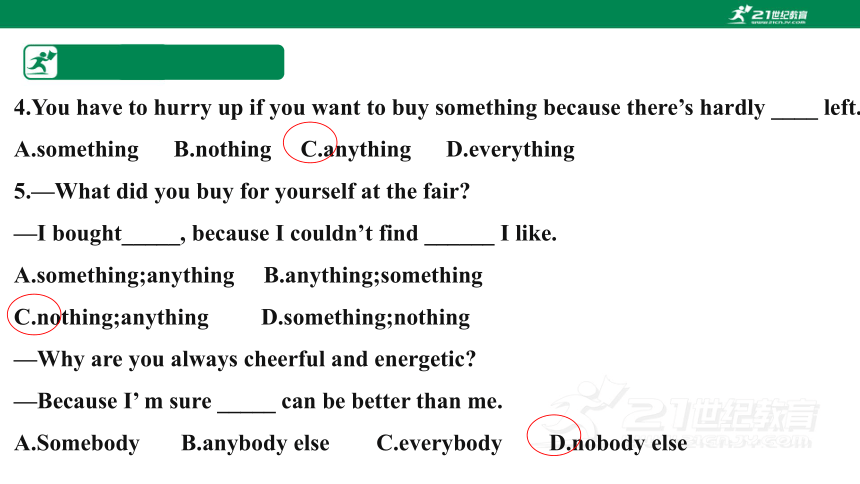
文档简介
(共32张PPT)
Unit 1 Where did you go on vacation
Section A (GF-3c)
人教版八年级下册
Learning objectives
Key words & phrases:
something, nothing, everyone, of course, myself, yourself, hen, pig, seem, bored, someone, diary
Key sentences:
1. No one was here. Everyone was on vacation.
2. The only problem was that there was nothing much to do in the
evening but read. Still no one seemed to be bored.
To learn compound indefinite pronoun(复合不定代词)and reflexive pronoun(反身代词).
A:Where did you go on vacation
B:I went to the beach.
Review
A:Where did she go on vacation
B:She stayed at home.
--Where did they go on vacation
--They went hiking.
--Where did they go on vacation
--They went to summer camp.
Presentation
Grammar Focus
Where did you go on vacation I went to New York City.
Did you go out with anyone No. No one was here. Everyone was on vacation.
Did you buy anything special Yes, I bought something for my father.
No, I bought nothing.
How was the food Everything tasted really good!
Did everyone have a good time Oh, yes. Everything was excellent.
1.定义:由some, any, no, every分别加上-one, -body, -thing构成的不定代词叫做合成不定代词或复合不定代词。
复合不定代词
2.常见的复合不定代词
somebody 某人 someone 某人 something 某物,某事 anybody 任何人
anyone 任何人
anything 任何事物
nobody 没有人 no one 没有人 nothing 没有东西 everybody 每人
everyone 每人
everything
每一件事情;一切
相当于名词,可作主语、宾语和表语,不作定语;作主语时谓语要用单数形式。
3.用法:
e.g. Nothing is difficult if you put your heart into it.
(作主语)
e.g. I have nothing to say today.
(作宾语)
(作表语)
That is nothing.
(2) somebody/ someone/ something一般用于肯定句,
anybody/ anyone/ anything一般用于否定句、疑问句或条件状语从句。
(3)复合不定代词被形容词、不定式、定语从句修饰时,必须放在这些代词之后。
e.g. There is nothing wrong with the machine.
Do you want anything to drink
If there is anything I can do for you, tell me.
1.Morning, class. Is ____ here today
—No, sir. Tom is absent. He is ill at home.
A.Anybody B.everybody C.nobody D.somebody
2.Who helped you sweep the classroom yesterday
—________.I did it all by myself.
A.Somebody B.Anybody C.Nobody D.Everybody
3.Look! The clock has stopped. Maybe there’s _____ wrong with it.
A.everything B.something C.anything D.nothing
4.You have to hurry up if you want to buy something because there’s hardly ____ left.
A.something B.nothing C.anything D.everything
5.—What did you buy for yourself at the fair
—I bought_____, because I couldn’t find ______ I like.
A.something;anything B.anything;something
C.nothing;anything D.something;nothing
—Why are you always cheerful and energetic
—Because I’ m sure _____ can be better than me.
A.Somebody B.anybody else C.everybody D.nobody else
3a
Fill in the blanks with the words in the box and practice the conversation.
anyone something anything everything nothing
Linda: Did you do___________ fun on your vacation, Alice
Alice: Yes, I did. I went to Sanya.
Linda: How did you like it
Alice: Well, it was my first time there, so___________
was really interesting.
anything
everything
你认为它怎么样
Linda: Did you go with__________
Alice: Yes, I did. I went with my sister.
Linda: Did you go shopping
Alice: Of course! I bought__________ for my parents, but _________for myself.
Linda: Why didn’t you buy__________ for yourself
Alice: I didn’t really see ____________I liked.
anyone
something
nothing
anything
anything
我自己
你自己
1.How do/did you like… “你觉得……怎样?”
用来询问对方的观点或看法
= What do/ did you think of…
=How do/ did you feel about…
e.g. How do you like your new job
= _____ _____ _____ _____ _____ your new job
= _____ _____ _____ _____ ______ your new job
do you think of
How do you feel about
What
myself (我自己) , yourself (你自己)是反身代词。
表示“某人自己的词”叫反身代词。在句中可做介词宾语、同位语,但不能单独做主语。
myself yourself himself herself itself
我自己 你自己 他自己 她自己 它自己
ourselves yourselves themselves
我们自己 你们自己 他们自己
2.反身代词小结:
(1)作宾语
①反身代词用在动词后面,作动词的宾语,常见固定短语,
玩得开心enjoy oneself ; 自学teach oneself ;
伤着自己hurt oneself ; 自我介绍introduce oneself to sb ;
自己穿衣服dress oneself ;随便吃/用help oneself to 。
e.g. When he was a little boy he could teach himself English.
当他还是一个孩子的时候,他就能自学英语。
②反身代词可以用在介词to, for, by, of, like等后面作介词宾语。e.g. She is talking to herself. 她在自言自语。
Did you buy anything for yourself
你为你自己买什么东西了吗
(2)做同位语
反身代词可以作主语或宾语的同位语,起强调作用,
意思是:亲自、本身等。作主语同位语可以放在主语的后面或者是句子的后面。
e.g. She herself is a teacher.她本人是一个老师。
(herself作she的同位语,放在主语后面)
Did you cook the meal yourself 你亲自做的饭吗?
(yourself作you的同位语,放在句子末)
(3)用作表语
反身代词用在be, feel, seem, look等系动词后作表语,用来表示身体或精神状态。
e.g. I am feeling myself again. 我感觉自己健康如初。
She is not herself today. 她今天不舒服。
Fill in the blanks in the e-mail message with the words in the box.
3b
anything everything nothing everyone no one
Dear Bill,
How was your vacation Did you do ________ interesting Did________ in the family go with you I went to a friend’s farm in the countryside with my family. __________was great.
anything
everyone
Everything
We fed some hens and saw some baby pigs. They were so cute! The only problem was that there was __________ much to do in the evening but read. Still __________ seemed to be bored. Bye for now!
Mark
nothing
no one
feed v. 喂养
除了
似乎
1. The only problem was that there was nothing much to do in the evening but read.
nothing much to do “没什么事可做”
e.g. 今天下午我没什么特殊的事可做。
I have ________ _____ __ ____this afternoon.
没什么事可做,因此我就早早睡觉了。
There is _______ ______ __ ____,so I go to bed early.
nothing much to do
nothing much to do
拓展:nothing…but…“除……之外什么也没有;只有”。
but后可接名词或动词原形。
e.g. 我今天早上只喝了杯茶。
I had nothing but a cup of tea this morning.
我无事可做,只有看电视。
I had nothing to do but watch TV.
2. Still no one seemed to be bored.
seem不及物动词或系动词,“好像;似乎;看来”。
seem + n. “看起来……”。
e.g. He seems a nice person.他看起来是个好人。
② seem + (to be) + adj. “看起来……”
e.g. The movie seems (to be) interesting.这部电影似乎很有趣。
④ It seems/ seemed+ that从句 “看起来像……”。
e.g. It seems that no one believes you.看起来好像没有人相信你。
⑤ seem like… “好像,似乎……”。
e.g. It seems like a good idea.它好像是个好主意。
③ seem + to do sth. “似乎要做某事”。
e.g. The teacher seems to agree with me.老师似乎同意我的观点。
我发现这个故事太无聊了。
I find the story very ________.
e.g. 我对他说的话厌烦极了。
I’m ______ with what he said.
bored “厌烦的;感到无聊的”,修饰人,作表语。
boring “无聊的;令人厌烦的”,修饰事或物,可作表语和定语。
bored
boring
(2) 辨析:bored 与 boring
3c
Ask your group questions about their last vacation. Then tell the class your results.
Did you… Everyone Someone (write the classmates’ name ) No one
eat anything at a restaurant
read anything interesting
visit anyone in your family
buy anything
keep a diary
Group Work
In our group, everyone ate something at a restaurant. No one read anything interesting. Li Lei visited his grandparents in the town. Liu Xue bought something interesting. Xu Li kept a diary.
Ask your classmates , then give us your group results!
Report
Homework
1.Memorize the words and sentences in the period.
2.背诵Grammar focus部分。
3.复习复合不定代词及反身代词的用法。
谢谢
21世纪教育网(www.21cnjy.com)
中小学教育资源网站
兼职招聘:
https://www.21cnjy.com/recruitment/home/admin
Unit 1 Where did you go on vacation
Section A (GF-3c)
人教版八年级下册
Learning objectives
Key words & phrases:
something, nothing, everyone, of course, myself, yourself, hen, pig, seem, bored, someone, diary
Key sentences:
1. No one was here. Everyone was on vacation.
2. The only problem was that there was nothing much to do in the
evening but read. Still no one seemed to be bored.
To learn compound indefinite pronoun(复合不定代词)and reflexive pronoun(反身代词).
A:Where did you go on vacation
B:I went to the beach.
Review
A:Where did she go on vacation
B:She stayed at home.
--Where did they go on vacation
--They went hiking.
--Where did they go on vacation
--They went to summer camp.
Presentation
Grammar Focus
Where did you go on vacation I went to New York City.
Did you go out with anyone No. No one was here. Everyone was on vacation.
Did you buy anything special Yes, I bought something for my father.
No, I bought nothing.
How was the food Everything tasted really good!
Did everyone have a good time Oh, yes. Everything was excellent.
1.定义:由some, any, no, every分别加上-one, -body, -thing构成的不定代词叫做合成不定代词或复合不定代词。
复合不定代词
2.常见的复合不定代词
somebody 某人 someone 某人 something 某物,某事 anybody 任何人
anyone 任何人
anything 任何事物
nobody 没有人 no one 没有人 nothing 没有东西 everybody 每人
everyone 每人
everything
每一件事情;一切
相当于名词,可作主语、宾语和表语,不作定语;作主语时谓语要用单数形式。
3.用法:
e.g. Nothing is difficult if you put your heart into it.
(作主语)
e.g. I have nothing to say today.
(作宾语)
(作表语)
That is nothing.
(2) somebody/ someone/ something一般用于肯定句,
anybody/ anyone/ anything一般用于否定句、疑问句或条件状语从句。
(3)复合不定代词被形容词、不定式、定语从句修饰时,必须放在这些代词之后。
e.g. There is nothing wrong with the machine.
Do you want anything to drink
If there is anything I can do for you, tell me.
1.Morning, class. Is ____ here today
—No, sir. Tom is absent. He is ill at home.
A.Anybody B.everybody C.nobody D.somebody
2.Who helped you sweep the classroom yesterday
—________.I did it all by myself.
A.Somebody B.Anybody C.Nobody D.Everybody
3.Look! The clock has stopped. Maybe there’s _____ wrong with it.
A.everything B.something C.anything D.nothing
4.You have to hurry up if you want to buy something because there’s hardly ____ left.
A.something B.nothing C.anything D.everything
5.—What did you buy for yourself at the fair
—I bought_____, because I couldn’t find ______ I like.
A.something;anything B.anything;something
C.nothing;anything D.something;nothing
—Why are you always cheerful and energetic
—Because I’ m sure _____ can be better than me.
A.Somebody B.anybody else C.everybody D.nobody else
3a
Fill in the blanks with the words in the box and practice the conversation.
anyone something anything everything nothing
Linda: Did you do___________ fun on your vacation, Alice
Alice: Yes, I did. I went to Sanya.
Linda: How did you like it
Alice: Well, it was my first time there, so___________
was really interesting.
anything
everything
你认为它怎么样
Linda: Did you go with__________
Alice: Yes, I did. I went with my sister.
Linda: Did you go shopping
Alice: Of course! I bought__________ for my parents, but _________for myself.
Linda: Why didn’t you buy__________ for yourself
Alice: I didn’t really see ____________I liked.
anyone
something
nothing
anything
anything
我自己
你自己
1.How do/did you like… “你觉得……怎样?”
用来询问对方的观点或看法
= What do/ did you think of…
=How do/ did you feel about…
e.g. How do you like your new job
= _____ _____ _____ _____ _____ your new job
= _____ _____ _____ _____ ______ your new job
do you think of
How do you feel about
What
myself (我自己) , yourself (你自己)是反身代词。
表示“某人自己的词”叫反身代词。在句中可做介词宾语、同位语,但不能单独做主语。
myself yourself himself herself itself
我自己 你自己 他自己 她自己 它自己
ourselves yourselves themselves
我们自己 你们自己 他们自己
2.反身代词小结:
(1)作宾语
①反身代词用在动词后面,作动词的宾语,常见固定短语,
玩得开心enjoy oneself ; 自学teach oneself ;
伤着自己hurt oneself ; 自我介绍introduce oneself to sb ;
自己穿衣服dress oneself ;随便吃/用help oneself to 。
e.g. When he was a little boy he could teach himself English.
当他还是一个孩子的时候,他就能自学英语。
②反身代词可以用在介词to, for, by, of, like等后面作介词宾语。e.g. She is talking to herself. 她在自言自语。
Did you buy anything for yourself
你为你自己买什么东西了吗
(2)做同位语
反身代词可以作主语或宾语的同位语,起强调作用,
意思是:亲自、本身等。作主语同位语可以放在主语的后面或者是句子的后面。
e.g. She herself is a teacher.她本人是一个老师。
(herself作she的同位语,放在主语后面)
Did you cook the meal yourself 你亲自做的饭吗?
(yourself作you的同位语,放在句子末)
(3)用作表语
反身代词用在be, feel, seem, look等系动词后作表语,用来表示身体或精神状态。
e.g. I am feeling myself again. 我感觉自己健康如初。
She is not herself today. 她今天不舒服。
Fill in the blanks in the e-mail message with the words in the box.
3b
anything everything nothing everyone no one
Dear Bill,
How was your vacation Did you do ________ interesting Did________ in the family go with you I went to a friend’s farm in the countryside with my family. __________was great.
anything
everyone
Everything
We fed some hens and saw some baby pigs. They were so cute! The only problem was that there was __________ much to do in the evening but read. Still __________ seemed to be bored. Bye for now!
Mark
nothing
no one
feed v. 喂养
除了
似乎
1. The only problem was that there was nothing much to do in the evening but read.
nothing much to do “没什么事可做”
e.g. 今天下午我没什么特殊的事可做。
I have ________ _____ __ ____this afternoon.
没什么事可做,因此我就早早睡觉了。
There is _______ ______ __ ____,so I go to bed early.
nothing much to do
nothing much to do
拓展:nothing…but…“除……之外什么也没有;只有”。
but后可接名词或动词原形。
e.g. 我今天早上只喝了杯茶。
I had nothing but a cup of tea this morning.
我无事可做,只有看电视。
I had nothing to do but watch TV.
2. Still no one seemed to be bored.
seem不及物动词或系动词,“好像;似乎;看来”。
seem + n. “看起来……”。
e.g. He seems a nice person.他看起来是个好人。
② seem + (to be) + adj. “看起来……”
e.g. The movie seems (to be) interesting.这部电影似乎很有趣。
④ It seems/ seemed+ that从句 “看起来像……”。
e.g. It seems that no one believes you.看起来好像没有人相信你。
⑤ seem like… “好像,似乎……”。
e.g. It seems like a good idea.它好像是个好主意。
③ seem + to do sth. “似乎要做某事”。
e.g. The teacher seems to agree with me.老师似乎同意我的观点。
我发现这个故事太无聊了。
I find the story very ________.
e.g. 我对他说的话厌烦极了。
I’m ______ with what he said.
bored “厌烦的;感到无聊的”,修饰人,作表语。
boring “无聊的;令人厌烦的”,修饰事或物,可作表语和定语。
bored
boring
(2) 辨析:bored 与 boring
3c
Ask your group questions about their last vacation. Then tell the class your results.
Did you… Everyone Someone (write the classmates’ name ) No one
eat anything at a restaurant
read anything interesting
visit anyone in your family
buy anything
keep a diary
Group Work
In our group, everyone ate something at a restaurant. No one read anything interesting. Li Lei visited his grandparents in the town. Liu Xue bought something interesting. Xu Li kept a diary.
Ask your classmates , then give us your group results!
Report
Homework
1.Memorize the words and sentences in the period.
2.背诵Grammar focus部分。
3.复习复合不定代词及反身代词的用法。
谢谢
21世纪教育网(www.21cnjy.com)
中小学教育资源网站
兼职招聘:
https://www.21cnjy.com/recruitment/home/admin
同课章节目录
- Unit 1 Where did you go on vacation?
- Section A
- Section B
- Unit 2 How often do you exercise?
- Section A
- Section B
- Unit 3 I'm more outgoing than my sister.
- Section A
- Section B
- Unit 4 What's the best movie theater?
- Section A
- Section B
- Unit 5 Do you want to watch a game show?
- Section A
- Section B
- Unit 6 I'm going to study computer science.
- Section A
- Section B
- Unit 7 Will people have robots?
- Section A
- Section B
- Unit 8 How do you make a banana milk shake?
- Section A
- Section B
- Unit 9 Can you come to my party?
- Section A
- Section B
- Unit 10 If you go to the party, you'll have a grea
- Section A
- Section B
